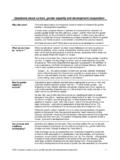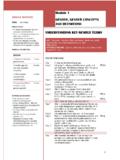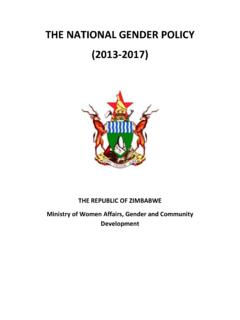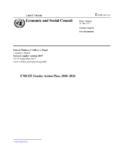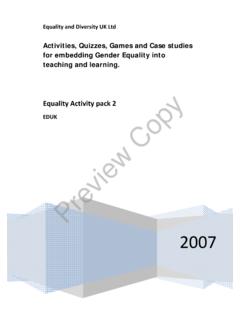Transcription of CULTURE, TRADITION, CUSTOM, LAW AND …
1 Author: MJ Maluleke culture , tradition , custom , law and gender equality . ISSN 1727-3781. 2012 VOLUME 15 No 1. MJ MALULEKE PER / PELJ 2012(15)1. culture , tradition , custom , law and gender equality . MJ Maluleke*. culture is like an umbrella under which some people like to hide from rain, and also to shade themselves from the sun. But sometimes you need to fold it.**. 1 Introduction Traditional cultural practices reflect the values and beliefs held by members of a community for periods often spanning generations. Every social grouping in the world has specific traditional cultural practices and beliefs, some of which are beneficial to all members, while others have become harmful to a specific group, such as women.
2 These harmful traditional practices include early and forced marriages (Ukuthwala as practised currently), virginity testing, widow's rituals, 'u ku ngena' (levirate and sororate unions1), female genital mutilation2 (FGM), breast sweeping/ironing, the primogeniture rule, practices such as 'cleansing' after male circumcision, and witch-hunting. Despite their harmful nature and their violation of national and international human rights laws, such practices persist because they are not questioned or challenged and therefore take on an aura of morality in the eyes of those practising them. *. Mikateko Joyce Maluleke. Advocate of the High Court; Director in the gender Directorate.
3 Department of Justice and Constitutional Development (Republic of South Africa). Presentation delivered at the Conference of the South African Chapter of the International Association of Women Judges (SAC-IAWJ) in partnership with the North-West University (Potchefstroom Campus), Faculty of Law, Potchefstroom; LexisNexis; Juta and Do: gender Directorate entitled "Equal access to Education and Training for Women: Pathway to Decent work for Women", on 12-13 August 2011 at Potchefstroom, South Africa. **. Ramphela "Speech". 1. Levirate unions occur when the deceased's surviving male relative inherits the widow of the deceased.
4 Sororate unions occur where the widower is inherited by the deceased wife's surviving female relative. The inherited widow or widower becomes the wife or husband to the surviving relative of the deceased. 2. FGM is not just the cutting of the clitoris; it includes disfigurement, and the changing of the form or elongation of the labia as practiced by Tsonga and Sotho communities. 2 / 428. MJ MALULEKE PER / PELJ 2012(15)1. The purpose of this article is to discuss the impact of CULTURE, 3 tradition4 custom5 and law on gender equality . However, before the article discusses that matter it will examine the influence of colonialism6, imperialism7 and apartheid on the African culture , traditions and customs with particular reference to South African culture , traditions and customs.
5 This will include a brief review at what really constitutes African culture , tradition and custom , and what is a colonial or imperial construct which is now regarded as African culture , tradition and custom . It will be argued that the primogeniture rule8 is not an original African cultural principle but a colonial and imperial construct. In our dialogue about the revival of our culture , tradition and customs we need to interrogate what is African and what is a colonial or imperial construct. The presentation will demonstrate that law reform and development have traditionally focused on reforming state legal institutions to the exclusion of customary legal systems, and that where the courts had an opportunity to develop the customary legal systems they either reinforced archaic customary laws or imposed western ideology.
6 It will show that pre-colonial and pre-apartheid African culture , traditions and customs were based on Ubuntu. It will conclude by showing that harmful traditional practices, as outlined previously, are a violation of women's human rights as guaranteed in the Constitution, perpetuate the inequalities between women and men, and contribute to the extreme poverty that government is trying to eradicate. 3. culture is a combination of the ideas, customs and social behaviour of a particular people or society (Weiner and Simpson Oxford English Dictionary). 4. tradition is the transmission of customs or beliefs from generation to generation; it is a long established custom or belief that has passed from one generation to another (Weiner and Simpson Oxford English Dictionary).
7 5. custom is a traditional and widely accepted way of behaving or doing something that is specific to a particular society, place or time; it is things done habitually (Weiner and Simpson Oxford English Dictionary). 6. Colonialism is the establishment, maintenance, acquisition and expansion of colonies in one territory by people from another territory (Wikipedia [date unknown]a ). 7. Imperialism means creating an empire, expanding into the neighbouring regions and expanding dominance. Its origins date back to the Romans. It involves political and economic domination of the other ( [date unknown] ). Imperialism takes the form of political control and creating economic dependence.
8 8. The primogeniture rule is the right, by law or custom , of a firstborn to inherit the entire estate, to the exclusion of younger siblings (Wikipedia [date unknown]c ). 3 / 428. MJ MALULEKE PER / PELJ 2012(15)1. 2 Background African culture has experienced rapid change since the colonial invasion. Contemporary African culture is a mixture of traditional elements and alien features. Local African culture was oppressed for many years by white South Africans, who find their cultural roots in western countries. Western cultures tend to be more individualistic and focused on individual achievements and personal interests, whereas African cultures are collectivistic, group-oriented, and concerned with the welfare of their community.
9 Native law was officially recognised in 1848, but only insofar as it did not infringe on the humanitarian principles of 'civilised society' understood to be 'white society' in that The aim was to maintain control over African people. The strategy adopted was to manipulate the way of life through the codification of customary law, as seen from the eyes of the colonisers. Many research reports and scholarly writings have revealed that customary law and its practices have been tampered with. Writers such as Prof Chanock and others argue that: Although there is the view that colonialists 'invented' customary law as a way to govern natives while under the auspices of paying tribute to their culture and heritage, some other writers have argued that customary law was not so much 'invented' by them, but 'manipulated' so as to conform the actual practices of the natives to their westernized ideals as part of their 'civilizing mission'.
10 These writers prefer to view the colonial influence more as 'imagination', rather than 'invention'.10. However, due to the living nature of customary law, there is one African principle that colonialism and imperialism could not manipulate, Ubuntu. All Africans, particularly indigenous Africans, will tell you that our parents always taught us about Ubuntu. (It is not clear whether current parents are passing on the baton or not). Ubuntu means, 'I am what I am because of who we all are'. Ubuntu underscores the importance of agreement or consensus. 9. Wikipedia [date unknown]b 10. Wikipedia [date unknown]b 4 / 428. MJ MALULEKE PER / PELJ 2012(15)1.











